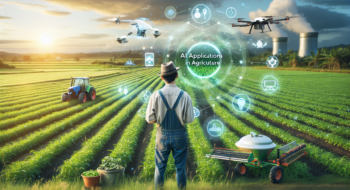In today’s world, effective waste management and recycling processes are more crucial than ever, as the global environmental crisis compels us to rethink how we handle our waste. Enter artificial intelligence (AI), a transformative force that is revolutionizing these sectors. AI technology is being harnessed for smart sorting, enabling more accurate and efficient separation of recyclable materials. This innovation not only enhances recycling optimization but also minimizes landfill waste, paving the way for a sustainable future. Explore how AI is reshaping our approach to waste management and helping us build a cleaner planet.
The Role of AI in Waste Management
AI is transforming the landscape of waste management in several key ways, each contributing to a more efficient, sustainable, and cost-effective process.
Optimizing Waste Collection
Traditional waste collection methods often suffer from inefficiencies such as suboptimal routing and irregular schedules. However, AI-powered systems are addressing these challenges by optimizing waste collection routes. Smart bin systems equipped with sensors and AI algorithms can monitor waste levels in real-time, enabling efficient collection planning and resource allocation.
- Route Optimization: AI algorithms analyze historical data, traffic patterns, and waste generation rates to determine the most efficient routes for waste collection vehicles. This reduces the number of trucks needed, minimizes carbon emissions, and enhances overall efficiency.
Smart Sorting and Recycling
AI is playing a crucial role in waste recycling by optimizing various stages of the recycling process.
- Material Identification: AI-driven technologies, such as those developed by Greyparrot, use imaging to identify and separate recyclable materials like plastics, aluminum, and paper. This maximizes resource recovery and minimizes waste contamination.
- Process Optimization: AI models analyze data on recycling parameters, such as temperature, pressure, and composition, to identify optimal operating conditions and improve efficiency. AI-driven quality control and inspection systems ensure the production of high-quality recycled materials by detecting defects and contamination.
Enhancing Data-Driven Decision-Making
AI-powered sensors and IoT technologies are utilized to optimize waste collection by tracking the fill levels of waste bins and determining the need for collection. This real-time data collection enables waste facility managers to make informed decisions about material flows and revenue generation.
- Real-Time Monitoring: AI recycling bins equipped with sophisticated sensors monitor waste levels, allowing for the optimization of collection routes and schedules. This data can also be analyzed to identify patterns and trends in waste generation, helping policymakers develop effective waste management strategies.
Benefits of AI in Waste Management
The integration of AI in waste management offers several significant benefits:
Efficiency and Cost Savings
- AI can decrease costs by minimizing the number of trucks needed for waste collection and optimizing resource allocation.
- Automated processes reduce the need for manual labor, leading to cost savings and increased efficiency.
Environmental Sustainability
- AI enhances the quality of recycled materials by reducing contamination, which can increase revenue and preserve natural resources.
- By accurately sorting waste, AI recycling bins minimize the amount of waste sent to landfills, reducing greenhouse gas emissions associated with the production of new materials.
Public Health and Conservation
- Efficient waste management practices contribute to environmental conservation and public health by reducing pollution and the spread of diseases associated with improper waste disposal.
Challenges and Future Prospects
While AI offers numerous benefits in waste management, there are challenges to consider:
High Initial Investment
- The initial investment in AI technology can be high, although this is becoming more accessible as technology advances.
Need for Skilled Personnel
- Managing and interpreting AI systems require skilled personnel, which can be a barrier to widespread adoption.
Data Privacy and Security
- Concerns about data privacy and security are significant, but these challenges are likely to diminish as organizations upskill and technology becomes more secure.
Despite these challenges, the future of AI in waste management is promising. As organizations continue to innovate and integrate AI into their workflows, we can expect to see a leaner, greener, and more sustainable future.
Real-World Applications
Several companies and startups are already making significant strides in this field:
- Greyparrot: This UK startup uses AI-powered imaging to identify misplaced recyclables and enhance data collection in waste management facilities. Their technology has been adopted by major waste management companies and has revolutionized data collection practices.
- NANDO: Developed by the Italian startup ReLearn, NANDO is an AI solution that monitors, analyzes, and measures waste production, offering valuable insights on recycling and waste reduction. It also involves communities through a gamification approach to raise awareness about waste management.
Engaging Communities and Promoting Sustainability
AI recycling bins are not just about efficiency; they also play a crucial role in engaging and educating individuals about the importance of recycling.
- Interactive Education: AI recycling bins can display informative messages, statistics, and interactive games on digital screens, encouraging people to properly dispose of their waste and recycle more.
- Behavioral Changes: By making recycling a more interactive and rewarding experience, AI recycling bins help foster a culture of sustainability and encourage behavioral changes that lead to a cleaner environment.
Conclusion
The integration of AI in waste management is a pivotal step towards a more sustainable future. By enhancing efficiency, sustainability, and decision-making processes, AI technologies are transforming waste management practices and contributing significantly to environmental conservation and public health. As we continue to innovate and integrate AI into this sector, we are reinvesting in a leaner, greener, and more sustainable world.
For more information on how AI is revolutionizing waste management, visit Neyrotex.com.
As we move forward, the potential of AI in waste management continues to grow, and it is clear that this technology will be a cornerstone in our efforts to build a more sustainable future. For those interested in integrating AI into their waste management strategies, Neyrotex.com offers valuable insights and solutions.







